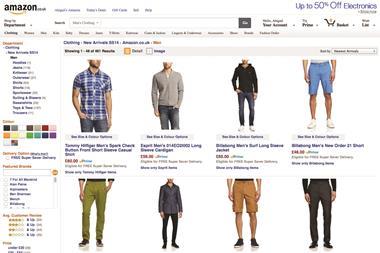Amazon has fired its latest salvo in its battle against fake reviews with action against 1,114 individuals, but what does it teach others?
The legal action, filed in the US on October 16, cites concerns that the practice is “tarnishing” Amazon’s brand and undermining consumers’ trust with “false, misleading and inauthentic reviews”.
As the etailer says in the court filing: “Honest and unbiased reviews allow customers to trust that they can shop with confidence on Amazon.com. In short: Amazon takes the credibility of its reviews very seriously.”
With the UK Competitions and Markets Authority estimating that £23bn of consumer spend every year is influenced by online reviews, it is little wonder Amazon is keen to weed out any issues that may cause consumers to doubt it. But all retailers should be aware of fake reviews and how the problem can be dealt with.
Why is Amazon pursuing legal action against individuals?
Amazon is targeting these individuals because it claims they have been actively promoting their services on online freelance marketplace Fiverr.com. It says:“The defendants are in the business of providing fake reviews.”
While it has worked with Fiverr in the past to remove individual listings, Amazon believes that has not addressed the root cause or acted as a deterrent to others so it has been forced to pursue action through other channels.
It aims to both shut down the ability of dishonest reviewers to sell their service through third-party channels and reduce the number of fake reviews.
What is the point of suing anonymous users?
With all 1,114 defendants listed as John Doe, Amazon admits it does not know who these people actually are although it says in the court filing it will amend the complaint to include real names when they are discovered.
Dan Smith, head of advertising and marketing law at Wragge Lawrence Graham & Co LLP, says: “Suing individuals in the US fires a warning shot, both to those involved in the production of fake reviews and, perhaps more importantly, to businesses tempted to commission fake reviews.”
However he warns many of those people will be based outside of the US and therefore outside of the jurisdiction, or adept at covering their tracks.
What are the individuals accused of?
As Amazon account holders each individual has broken Amazon’s conditions of use, which states it does not permit paid for reviews of any kind. As such, Amazon is saying it is a breach of contract.
Meanwhile, it alleges the defendants have engaged in “unfair and deceptive acts and business practices”, which violate the Washington Consumer Protection Act. It also alleges their “actions of disseminating false consumer reviews are injurious to the public interest”.
Amazon also claims that defendants have profited from what it says is illegal behaviour and obtained business through unlawful conduct.
Ashley Hurst, partner at law firm Olswang, who specialises in media and internet-related disputes, says: “Manipulating reviews with false information will not only breach website terms but is also likely to be in breach of marketing regulations in many countries, particularly if it causes consumers to make transactional decisions they wouldn’t otherwise have made.”
What is the significance of this action?
According to Smith, legal action like this by global players is likely to be more effective than legislation.
He adds: “Businesses around the world, who may have been tempted to get involved in dodgy reviewing practices to promote their products or knock their competitors, should sit up and take note.”
What is the situation in the UK?
The misleading online reviews and endorsements have already come to the attention of the Competition and Markets Authority, which compiled a ‘call for information’ report in June. It concluded these practices are going on but has not recommended regulation at this time.
Instead, it set out guidelines for online businesses that include being transparent when it comes to how online reviews are collected and checked; that all reviews, even negative ones, need to be published; that there are no unreasonable delays before reviews are published and that any commercial relationships and/or payments promotions are made clear.
Legislation on this issue, however, is thought to be both unlikely and unnecessary, especially as retailers in the UK are already held accountable for misleading content on their website via Trading Standards and the Advertising Standards Authority.
Meanwhile, Hurst believes self-policing by the genuine online community and the sophisticated technological solutions used by website operators are likely to be more effective than further regulation in solving the problem of fake reviews.
























1 Reader's comment